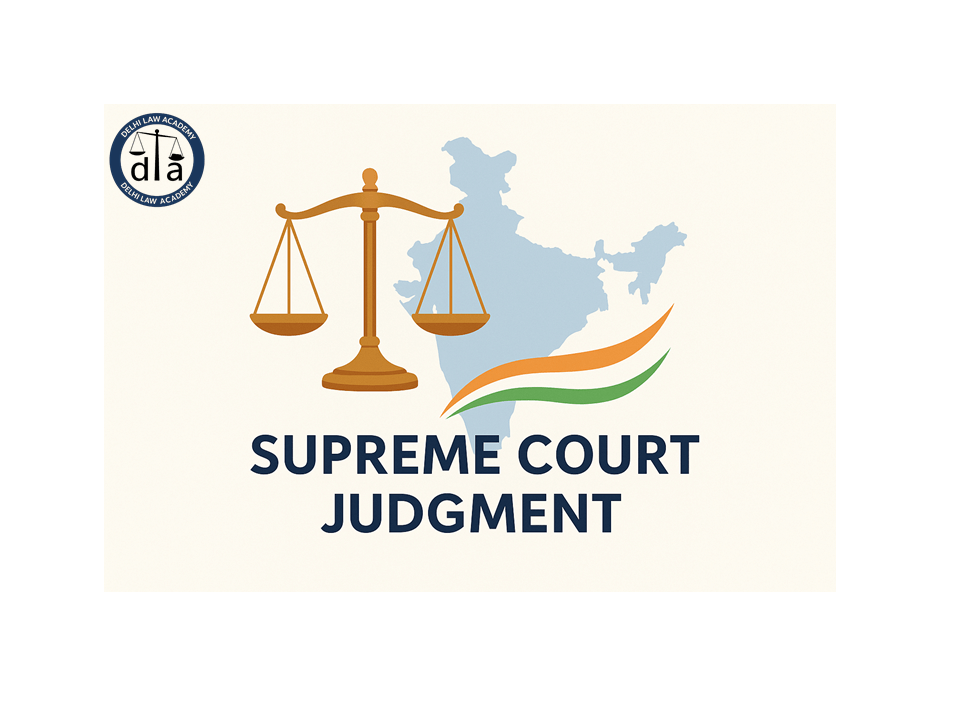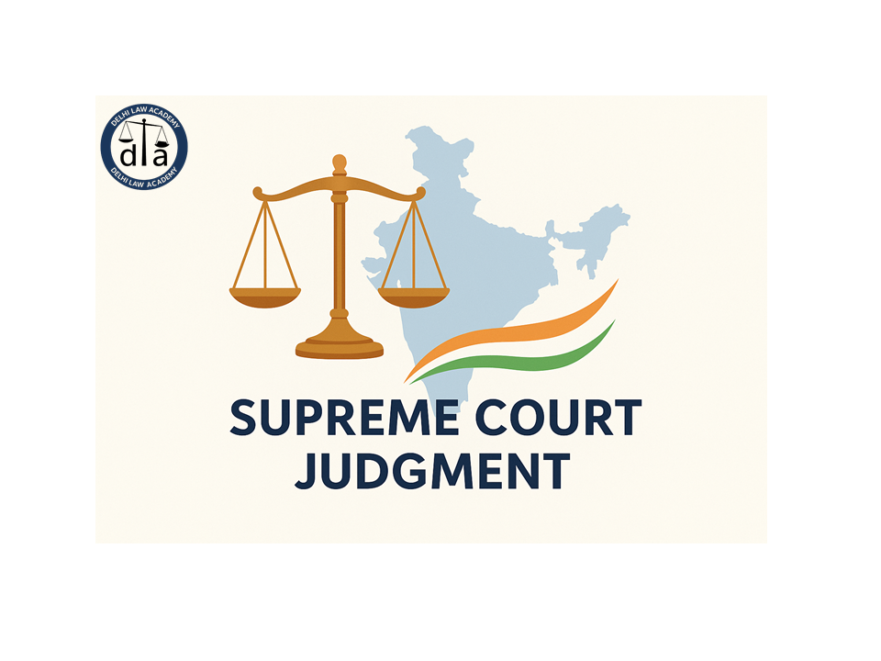
⚖️ Preparation for RJS, DJS, PCS(J) and Other Judicial Service Exams
📘 Section 125 CrPC: Maintenance under Section 125 CrPC
Supreme Court in Chanmuniya v. Virendra Kushwaha [2010]
- Whether or not presumption of a marriage arises when parties live together for a long time.
- What is meant by ‘wife’ under Section 125.
💡 Delhi Law Academy Jaipur presents below for aspirants of Rajasthan Judicial Service (RJS), DJS, PCS(J) and other Judicial Services throughout India a very important judgment of the Supreme Court of India in Chanmuniya v. Virendra Kushwaha [2010].
[Original language of the judgment has been maintained; it has not been disturbed or replaced]
🧾 Chanmuniya v. Virendra Kushwaha [SC 2010]
JUDGMENT
One Sarju Singh Kushwaha had two sons, Ram Saran (elder son) and Virendra Kumar Singh Kushwaha (younger son and the first respondent). The appellant, Chanmuniya, was married to Ram Saran and had 2 daughters-Asha, the first one, was born in 1988 and Usha, the second daughter, was born in 1990. Ram Saran died on 7.03.1992.
Thereafter, the appellant contended that she was married off to the first respondent as per the customs and usages prevalent in the Kushwaha community in 1996. The custom allegedly was that after the death of the husband, the widow was married off to the younger brother of the husband.
The appellant was married off in accordance with the local custom of Katha and Sindur. The appellant contended that she and the first respondent were living together as husband and wife and had discharged all marital obligations towards each other. The appellant further contended that after some time the first respondent started harassing and torturing the appellant, stopped her maintenance and also refused to discharge his marital obligations towards her.
As a result, she initiated proceedings under Section 125 of the Cr.P.C. for maintenance. This proceeding is pending.
She also filed a suit for the restitution of conjugal rights under Section 9 of the Hindu Marriage Act, 1955.
The Trial Court decreed the suit for restitution of conjugal rights in favour of the appellant on 3.1.2004 as it was of the opinion that the appellant had remarried the first respondent after the death of Ram Saran, and the first respondent had deserted the appellant thereafter. Thus, it directed the first respondent to live with the appellant and perform his marital duties.
One of the major issues which cropped up in the present case is whether or not presumption of a marriage arises when parties live together for a long time, thus giving rise to a claim of maintenance under Section 125 Cr.P.C. In other words, the question is what is meant by ‘wife’ under Section 125 of Criminal Procedure Code especially having regard to explanation under clause (b) of the Section.
Thus, the question that arises is whether a man and woman living together for a long time, even without a valid marriage, would raise as in the present case, a presumption of a valid marriage entitling such a woman to maintenance.
On the question of presumption of marriage, we may usefully refer to a decision of the House of Lords rendered in the case of Lousia Adelaide Piers & Florence A.M. De Kerriguen v. Sir Henry Samuel Piers [(1849) II HLC 331], in which their Lordships observed that the question of validity of a marriage cannot be tried like any other issue of fact independent of presumption. The Court held that law will presume in favour of marriage and such presumption could only be rebutted by strong and satisfactory evidence.
Thus, in those cases where a man, who lived with a woman for a long time and even though they may not have undergone legal necessities of a valid marriage, should be made liable to pay the woman maintenance if he deserts her. The man should not be allowed to benefit from the legal loopholes by enjoying the advantages of a de facto marriage without undertaking the duties and obligations. Any other interpretation would lead the woman to vagrancy and destitution, which the provision of maintenance in Section 125 is meant to prevent.
We are inclined to take a broad view of the definition of ‘wife’ having regard to the social object of Section 125. However, sitting in a two-Judge Bench, we cannot, we are afraid, take a view contrary to the views expressed in the abovementioned two cases.
We think the larger Bench may consider also the provisions of the Protection of Women from Domestic Violence Act, 2005. This Act assigns a very broad and expansive definition to the term ‘domestic abuse’ to include within its purview even economic abuse. ‘Economic abuse’ has been defined very broadly in sub-explanation (iv) to explanation I of Section 3 of the said Act to include deprivation of financial and economic resources.
Most significantly, the Act gives a very wide interpretation to the term ‘domestic relationship’ as to take it outside the confines of a marital relationship, and even includes live-in relationships in the nature of marriage within the definition of ‘domestic relationship’ under Section 2(f) of the Act.
Therefore, women in live-in relationships are also entitled to all the reliefs given in the said Act.
We are thus of the opinion that if the abovementioned monetary relief and compensation can be awarded in cases of live-in relationships under the Act of 2005, they should also be allowed in a proceedings under Section 125 of Cr.P.C.
We, therefore, request the Hon’ble Chief Justice to refer the following, amongst other, questions to be decided by a larger Bench. According to us, the questions are:
- Whether the living together of a man and woman as husband and wife for a considerable period of time would raise the presumption of a valid marriage between them and whether such a presumption would entitle the woman to maintenance under Section 125 Cr.P.C?
- Whether strict proof of marriage is essential for a claim of maintenance under Section 125 Cr.P.C. having regard to the provisions of Domestic Violence Act, 2005?
- Whether a marriage performed according to customary rites and ceremonies, without strictly fulfilling the requisites of Section 7(1) of the Hindu Marriage Act, 1955, or any other personal law would entitle the woman to maintenance under Section 125 Cr.P.C.?
We are of the opinion that a broad and expansive interpretation should be given to the term ‘wife’ to include even those cases where a man and woman have been living together as husband and wife for a reasonably long period of time, and strict proof of marriage should not be a pre-condition for maintenance under Section 125 of the CrPC, so as to fulfil the true spirit and essence of the beneficial provision of maintenance under Section 125.
📚 Further Reading for Law Aspirants
Explore more useful resources from Delhi Law Academy to strengthen your preparation:
❓ FAQs on Section 125 CrPC & Chanmuniya Case
Section 125 of the Criminal Procedure Code (CrPC) provides a legal remedy for wives, children, and parents who are neglected or refused maintenance. It ensures that dependents are not left destitute and upholds the social objective of preventing vagrancy.
In this case, the Supreme Court observed that women in long-term live-in relationships may also claim maintenance under Section 125 CrPC, even if strict proof of marriage is missing. The Court emphasized a liberal and humanitarian interpretation of the term “wife.”
Yes. The judgment in Chanmuniya v. Virendra Kushwaha paved the way for women in live-in relationships resembling marriage to seek maintenance, aligning with the spirit of the Domestic Violence Act, 2005.
This landmark case frequently appears in Judicial Services exams like RJS, DJS, and PCS(J) under questions relating to Section 125 CrPC, maintenance rights, and interpretation of “wife.” It is a must-read judgment for every aspirant.
The Domestic Violence Act provides protection and financial relief to women in domestic relationships, including live-in relationships. The Supreme Court referred to it in this case to support a broader interpretation of maintenance rights under Section 125 CrPC.
The Supreme Court requested a larger Bench to clarify:
1️⃣ Whether long-term cohabitation raises a presumption of marriage.
2️⃣ Whether strict proof of marriage is necessary for maintenance under Section 125.
3️⃣ Whether customary marriages without formal rituals can entitle women to maintenance.
Contact us
📍 Delhi Law Academy – Jaipur Branch
6C, Tower 2, Coaching Hub, Pratap Nagar, Jaipur – 302033
📞 Phone:
+91 9911916552
+91 8447285606
✉️ Email:
contactus@delhilawacademy.com

